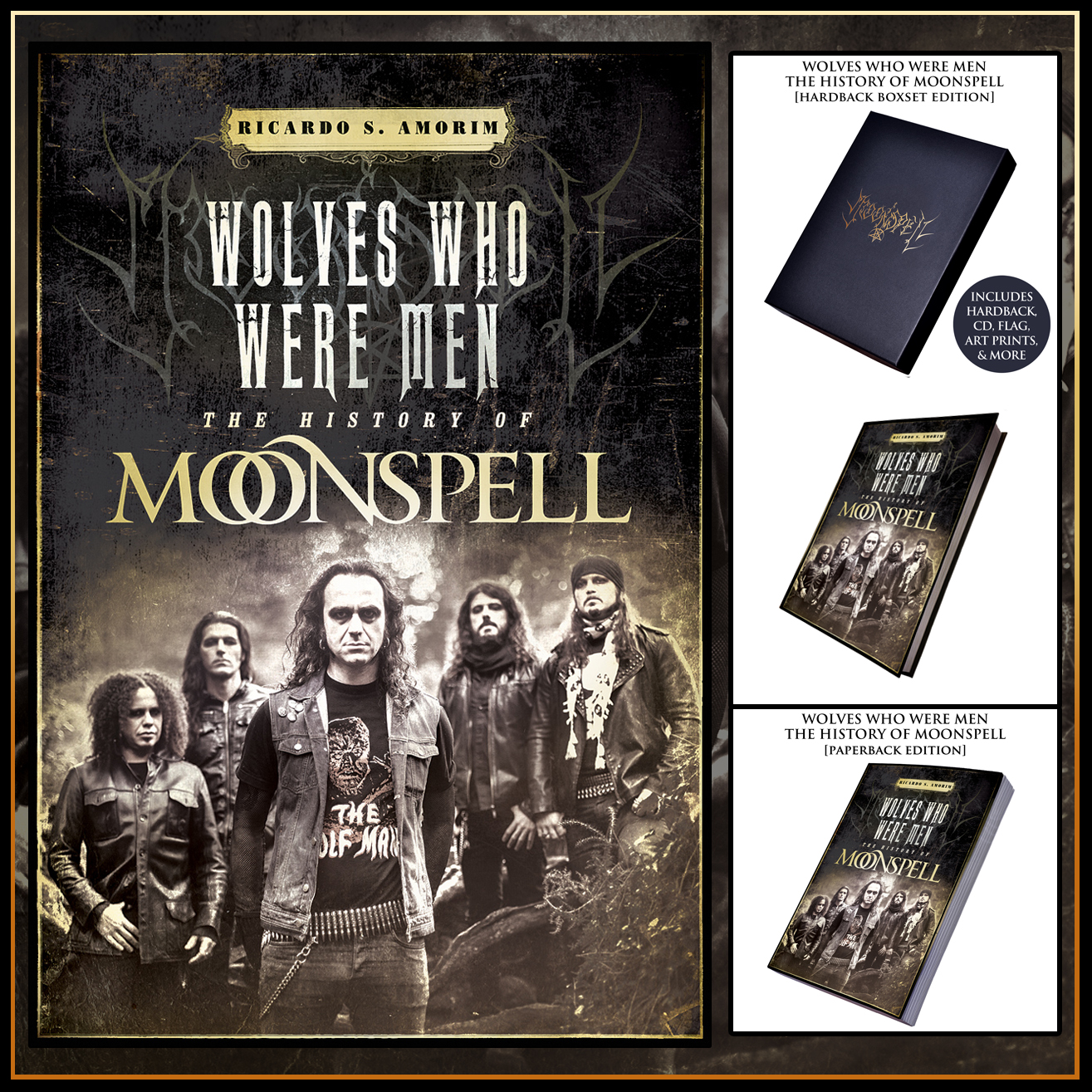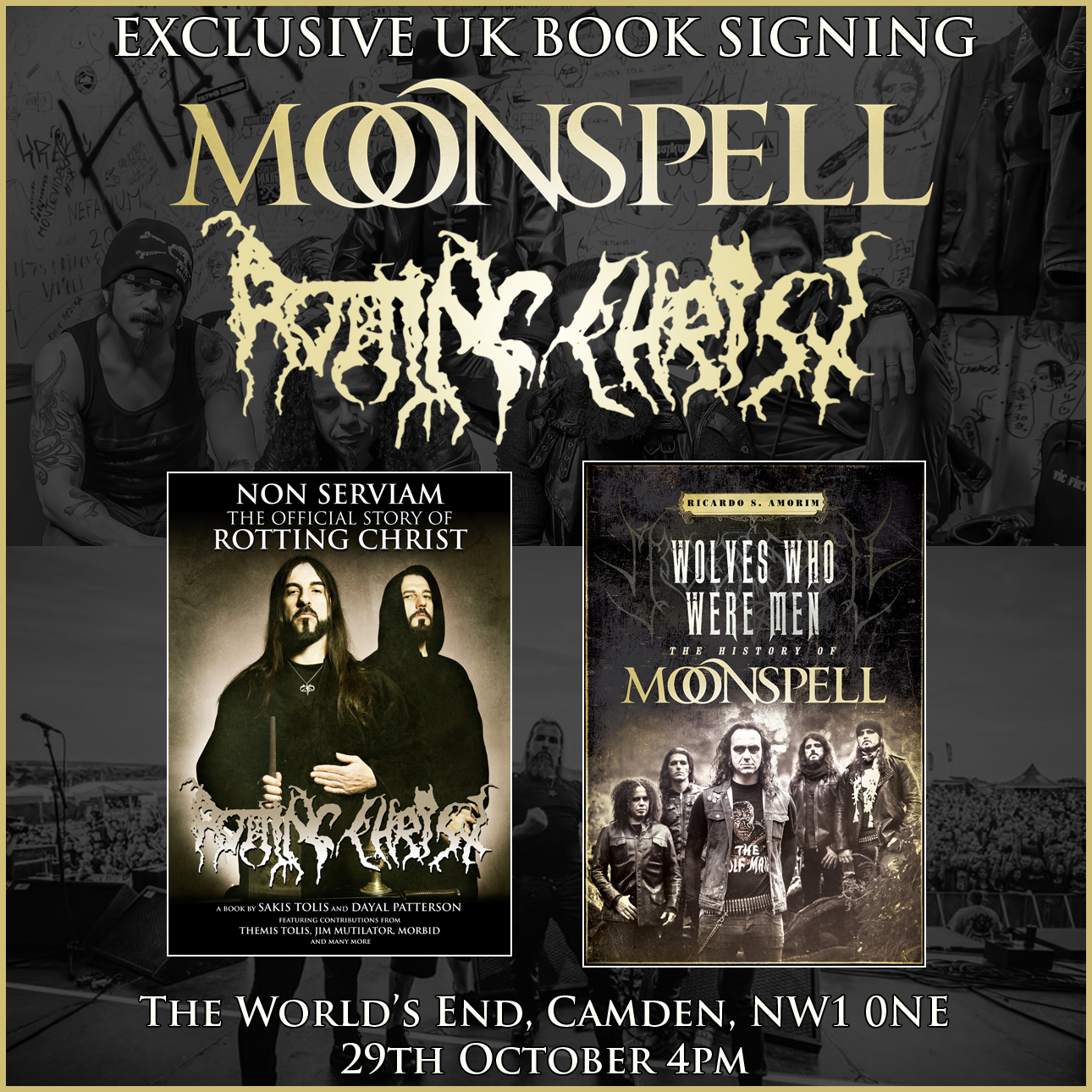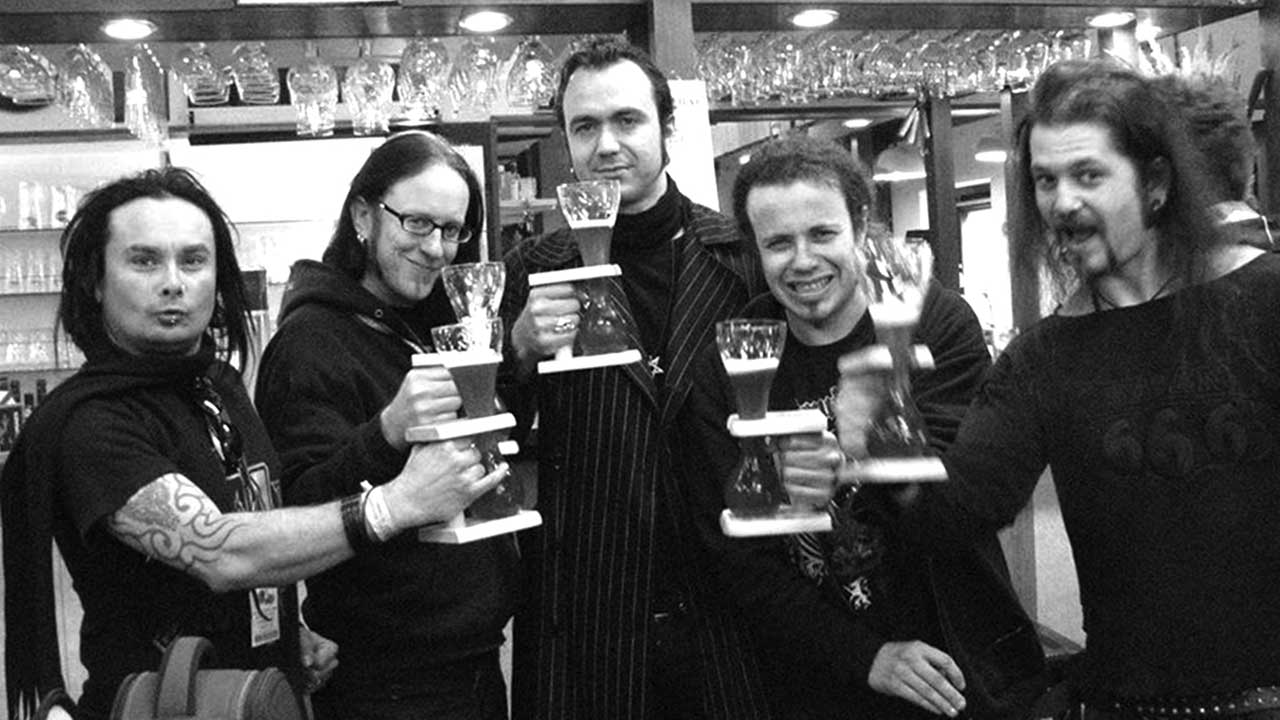Formed in Portugal in 1992, Moonspell quickly became one of the key figures in the gothic metal subgenre. Their 2006 album, Memorial, reached number one in the Portuguese charts – the first Portuguese metal band to achieve it, and only one of three metal bands (the others being Metallica and Iron Maiden).
With 11 studio albums under their belt the gothic heavyweights show no sign of stopping and are currently touring Europe with Greek extremists Rotting Christ as well as gearing up for the launch of their new book Wolves Who Were Men - The History Of Moonspell – due for release on Halloween via Cult Never Dies and Crypt Publications.
The candid 450 page book features lengthy interviews with the group’s current and former members – as well as members of bands such as tour mates Rotting Christ, the mighty Cradle of Filth, Samael, Kreator and many many more. Plus. a wealth of images, many previously unpublished.
To celebrate its debut, we've been given an exclusive excerpt from the book where Cradle of Filth frontman Dani Filth reminiscences about a tour back in 1994, which appropriately took place around All Hallow's Eve:

Late 1994 was a hectic period for Moonspell. After the release of their debut EP Under The Moonspell and a brief tour through Portugal, they played a few concerts that were crucial in establishing the band in the national scene, including one with the UK’s Cradle Of Filth.
“We had travelled to Portugal just before Halloween,” says Dani Filth, when asked about the concert at Gartejo, “and I believe the concert was on that auspicious day. It was a very exciting time, we played that concert with a stand-in guitar player and we all stayed with different members of Moonspell. I stayed with Ares, at his father’s place. The following days were spent exploring, particularly the local culture, but also the relationship between both bands. Let’s just say that we had an excellent time mixing business and pleasure.”
“The concert itself was certainly iconic. I remember how the curtain came down as soon as our intro song dissipated, and how the room went completely hysterical. We’ve played that same venue many times since then, but this is the sole moment that fills my mind with nostalgia.
I also remember Moonspell’s very dramatic performance, with Fernando emerging from within the robes of a dancing vampire, a vital moment in that performance. We had seen it before during one of our shared rehearsals, but the atmosphere of a live show always adds significance and gravitas to a performance, and this was no different. I would say that this was the beginning of an illustrious and extensively intertwined connection between both bands, which would blossom throughout the continents.”
Faced with the moderate success they were achieving, Moonspell increasingly demanded more of themselves, and recognized that many things would have to change. They wound up almost involuntarily achieving one of their key objectives, which was to secure a rehearsal space of their own, where they could work whenever and however they pleased without any time restrictions. “We got evicted from the hall in Brandoa, but we had meant to find our own space anyway,” vocalist Fernando recalls.
Up until then they had rehearsed at a local multipurpose hall, frequently using equipment that belonged to a local ballroom dance band that also rehearsed there, and they knew it was a precarious situation and felt rather unwelcome. “When we signed the contract, we knew we needed to start taking everything even more seriously and move out of there,” drummer Mike shares. “We looked at a few garages and ended up finding a place in Alfornelos, which we set up and soundproofed using Styrofoam. We even built a small office on the upper part with the help of some friends.”
O Covil (‘The Den’) as it became known, would become a mythical location in Moonspell’s history, and the place where part of debut album Wolfheart was composed. “It was our very own garage, no one used it but us, and we started building it up with equipment whenever we got the chance,” Fernando states.
“Wolfheart’s writing process was slightly hindered by the fact that we were switching rehearsal spaces. The circumstances under which we finished composing the album were a bit unfortunate, and we even had to spend some time rehearsing at Juke Box, a club in Lisbon, and at another studio in Amadora. We had a lot more responsibility now and finding our own rehearsal space became a priority. When we finally found the right place, we already had our Century Media contract in hand.”
Despite this setback, the writing process would be completed rather quickly, especially for a band in the beginning of their career. The debut album became a classic by its own merit, enchanting both in its naivety and its audacity, with diversity within and between songs, from the Bathory-like grandiosity of ‘Wolfshade’, through to the romantic ‘An Erotic Alchemy’, the heavy metal of ‘Of Dream And Drama’, the folk elements in ‘Trebaruna’ and ‘Ataegina’, and the essential ‘Vampiria’ and ‘Alma Mater’.
‘Trebaruna’ ended up as the only representation of this folk aspect present in the original release, following Century Media’s decision to leave out ‘Ataegina’, dubbing it a national drinking song. The lyrics were in no way related to this, alluding instead to a Lusitanian deity, but the song would nevertheless only see the light of day in Wolfheart’s second edition, which came out as a digipack. And the song has the most unlikely origin.
“‘Trebaruna’ was written by João, but ‘Ataegina’ was mine, and practically made to order,” Pedro Paixão says. “I told them, if you want some folk, here’s a folk song, and I wrote it in a couple of hours. I didn’t even like the song, though it’s grown on me. Folk was never really something I enjoyed,” the keyboard player points out. “The folk influence came mainly from João, but coincided with the phase we were going through, trying to find our roots,” Ares explains.
“We weren’t going to sing about the Portuguese maritime discoveries, that didn’t inspire us at all, we’d much rather go further back into Portugal’s pagan past, a very rich era in its own right. And, although we were huge fans of Bathory, even during the Hammerheart and Twilight Of The Gods era, it made no sense for us to go down the Viking metal path. That wasn’t us, so we decided to search for our own roots.”
One of the most iconic songs in the album is ‘Alma Mater’, and its composer, Duarte Picoto, is not shy about how proud he feels that it is possibly the most well-known Portuguese metal song ever. “I never imagined ‘Alma Mater’ would become as big as it did when I wrote it,” he says, somewhat surprised. “I can even tell you where the opening riff comes from. It’s exactly the same riff as Metallica’s ‘The Unforgiven’. The same chords played in the same places, but with a different cadence. In fact, James Hetfield was always my biggest influence.”
But this song would also be used by Moonspell’s (already many) detractors to attack the band, accusing them of certain political ideologies specifically because of the chorus. Ares completely rejects those claims. “It’s stupid, but people even started saying we were fascists.
But if the line sticks with people and is so closely related to our experiences at the time, why shouldn’t we use it? It has nothing to do with politics. Both my family and Fernando’s were left wing, and the lyrics were never an issue for them. People wanted to be ultra-analytical and attach a meaning to that sentence that just didn’t exist for us.
They didn’t realize we were talking about our own context and how we truly felt alone against the world. It had nothing to do with political ideology.” As for the impact the song itself had, it truly revealed itself when played live, something Ares attests to. “We felt like ‘Alma Mater’ was a strong track, but we only really realized the potential it had when we played it live. I even remember David Vincent came up to us during our tour with Morbid Angel just to compliment us on that song.”

Excerpt taken from the book Wolves Who Were Men - The History Of Moonspell, available to order here.

Moonspell and Rotting Christ will be holding an exclusive book presentation and signing of their new books upstairs at the legendary Camden pub The World's End in London ahead of both bands live performance the same night.
The Portuguese legends are celebrating the launch of their brand new book Wolves Who Were Men - The History Of Moonspell, officially released by Cult Never Dies and Crypt Publications on the 31st October.
The book’s author Ricardo S. Amorim will also be flying in from Portugal to attend the event.
Greek black metal pioneers Rotting Christ meanwhile will be signing their own biography Non Serviam: The Official Story Of Rotting Christ, released by Cult Never Dies and written by frontman Sakis Tolis and Dayal Patterson.
The presentation and talk will take place at 4pm. Entry is free.
Both books will be available to buy at the event in both standalone paperback and deluxe hardback boxset editions.
